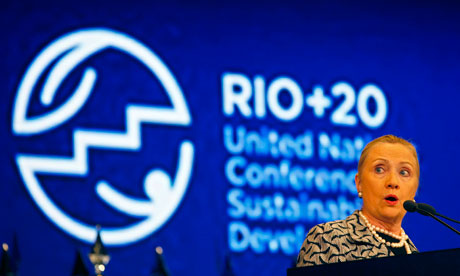Why business is locked into unsustainable and carbon-heavy cycles
Worldwide cynicism about official inaction over sustainability was hardly surprising, but capitalism locks us all into a system that feeds our carbon-hungry lives
- Guardian Professional, Friday 7 September 2012 17.39 BST
- Jump to comments (19)

After disappointing results in Copenhagen (2010) and Durban (2011), the world awaited Rio+20 with far less anticipation than we had for the Euro 2012 semi-finals, the successful crossing of Niagara Falls by Nik Wallenda, or the return of lunch blogger Martha Payne. Sustainable business, like all other business, has been riveted by the electoral politics of Greece and France and the more or less fictional pronouncements of G20 finance ministers. It was never likely that Rio+20 would change anything.
We know that the international discourse about sustainability will not reverse decades of inaction, that governments will not likely guide us from economic and environmental disaster into a new world order of hope and quality of life. Our deep cynicism is well founded; we have seen too many pronouncements fail.
Yet there is no human who does not prefer to live in hope. No business wants to discount its calculations of the net present value of future income streams by the absence of a future. No political leader wants to see the local impact of economic and environmental decline.
How is it that time and again we are unable to achieve what so many of us want? Why can we not achieve an agenda which is likely the only way forward into prosperity?
At the recent conference of the International Society of New Institutional Economists, Shi-Ling Hsu presented a paper looking at why we cannot get the answer right. In Physical, Human, and Social Capital as Barriers to Environmental Policy Change, he theorises that “environmentally harmful products and practices persist because firms and people have so much invested in their persistence”. We lock in unsustainable technologies and ways of life because capital is too expensive to write off without threatening the viability of a firm or a consumer. Oil companies and coal mine operators cannot afford to lose the value of their investments. State-owned enterprises are no less dependent on the value of carbon deposits than are for-profit companies.
Fishing villages and logging towns around the world want to maintain their livelihoods which depend on the extraction of decreasingly available stocks. Families who are making large mortgage and loan payments on suburban homes and cars are not easily convinced to leave their commitments and reinvest in housing and transport with a smaller carbon footprint.
Hsu suggests that we are locked into our carbon-hungry lives and our extractive livelihoods by specific and pervasive public policies which favour the creation and stability of capital. Grandfathering the use of old technology allows firms and their customers to get by with processes and equipment which are far worse than their replacements. Tax credits for extractive industries slow the movement of our economies into more sustainable industries. Capital gains taxes provide incentives to retain capital long past its “best before date” to avoid triggering tax penalties.
Too often firms must retain their holdings in assets that unnecessarily deplete natural resources or burn carbon in order to maintain healthy balance sheets. They cannot easily invest in new capital when governments allow them generous tax concessions on outdated technology.
We can better align incentives so that business will move out of the status quo and into more sustainable methods. Governments need not continue to support and subsidise outdated industries and processes. Instead, they might identify “environmentally-stranded capital” and let it be written down to zero over a relatively short period of time – if it is taken out of operation forever. If we really want companies to change, we must demand accelerated write-off schedules for investments in coal mines and trawlers.
One way forward is through better accounting standards. GDP+, the UK environment minister’s proposal to enter natural resources into a national chart of accounts, had the potential to resolve some of the tension between the desire of business to innovate and capital policies which lock us into old technology. When a nation assigns a value to its natural resources, it may be more likely to drop incentives which encourage resource depletion. Nick Clegg took the proposal to Rio. After appeals by Clegg and Joseph Stiglitz, the final text of the conference recognised the need for “broader measures of progress to complement GDP”. It referred the problem to the UN Statistical Commission.
Until our various legislators and regulators reconsider their capital-related policies, we will have fewer financial incentives than we need. Until we stop being rewarded for maintaining old equipment, investments and industries, we have little reason to reinvest or to favour the substantive change which Rio+20 might have brought. Without fixing financial regulations and accounting schemes, we cannot easily fix the earth.
Alison Kemper teaches management at York University and has worked with the Michael Lee-Chin Institute for Corporate Citizenship at the Rotman School since 2005. Her professional background is in advocacy and NGO management.
Roger Martin is dean of the University of Toronto’s Rotman School of Management and is academic director of the school’s Michael Lee-Chin Family Institute for Corporate Citizenship. His research work is in integrative thinking, business design, corporate social responsibility and country competitiveness. His most recent book is Fixing the Game.
This content is brought to you by Guardian Professional. Become a GSB member to get more stories like this direct to your inbox
